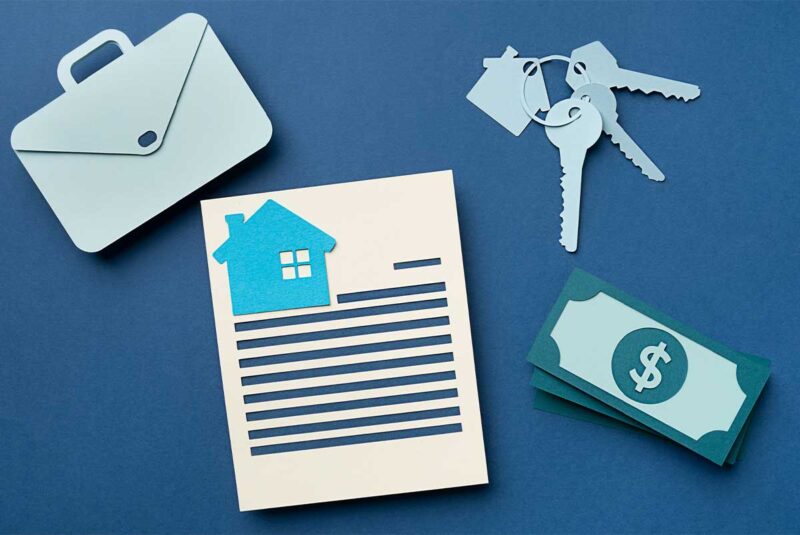Ready To Buy a Home?
Get Approved to Buy a Home
Rocket Mortgage® lets you get to house hunting sooner.
The housing market waits for nobody. If a great deal pops up in the right area, it could be gone before you have a chance to let your lease expire.
But is breaking a lease to buy a house really a good idea? Or should you wait until you’re closer to the end of your term to even start looking? We’ll go over what “breaking a lease” means legally, what most people actually mean and the different options available.
The Short Version
- Breaking a lease without cause can open you up to serious risks, including getting sued, hurting your credit score and having difficulty renting in the future
- If you need to get out of your lease to buy a home legally, consider options like early termination clauses, buyout agreements, negotiating with the landlord or subletting
- Getting out of a lease to buy a home can allow you to build equity faster and get more space, but you might need to account for a financial penalty and still provide some notice
Can You Break a Lease To Buy a House?
Legally speaking, breaking a lease versus getting out of a lease can be two different things. In legal terms, breaking a lease means that you stop making payments before the lease expires.
You should not just stop making payments on your lease. If you break the terms of your lease without cause, you open yourself up to some potentially serious consequences, including:
- You could get sued.
- You could lose your security deposit.
- You could be held financially responsible for missed payments.
- You could have trouble renting in the future.
- You could damage your credit.
Depending on the laws where you live, there are times when you can break your lease with cause and avoid the negative consequences – for example, if the landlord violates the lease terms or if the housing is deemed uninhabitable. However, these circumstances vary by region.
Usually, when people talk about “breaking their lease,” they’re referring to finding a way out of their lease. Let’s elaborate on that.
How To Get Out of a Lease
Depending on where you live, there are a lot of legal ways to get out of a lease. Some of them aren’t necessarily conducive to buying a house – for example, if you decide to join the military or if your landlord is harassing you.
Below, we’ve focused on the ones most likely to be helpful to you. But a word of warning: Most of these options require either time or financial compensation.
Early termination clause
These are especially common if you live in an apartment complex. The idea is that you provide written notice that you plan to terminate the lease (usually 30 – 60 days), and you may owe a financial penalty in exchange for ending the lease early. The specifics depend on the lease agreement you signed before moving into the unit.
Financial penalties vary widely depending on the property management or landlord. Some may require a termination fee worth multiple months of rent, while others might not charge you anything, so long as you provide enough notice.
Negotiate with the landlord
If you’re renting a house, townhouse or condo, there’s a chance you’re dealing with a landlord instead of a property management company. Either way, it’s worth speaking with them directly and seeing what you can negotiate.
Your landlord could agree out of the goodness of their heart to let you out of the agreement after a shorter period than what was initially agreed upon. Or you could switch to a month-to-month agreement, where you pay a little more but avoid the early termination penalty.
Remember, you’re extremely unlikely to get out of the lease immediately without paying any penalty. But if you talk to the people you’re renting from, you might be able to come up with a solution that’s fair to both parties.
Buyout agreement
These operate similarly to early termination agreements but are technically different because they’re negotiated after the lease has been signed. In this scenario, you and your landlord or property management company negotiate a lump-sum payment that ends the lease. The effective date is also up for negotiation.
Subletting the lease
Technically, you’re still responsible for the lease if you sublet. But practically, it can be an elegant solution to the problem. Subletting means you rent out the unit you’re renting to a tenant who pays you rent. In turn, you use those funds to pay your landlord or property manager.
Subletting does come with risks, as it puts you in the position of being a landlord without actually owning the property. And if your tenant doesn’t pay rent, you’re still on the hook for rent with your property management company or landlord. You also need to verify that your lease agreement allows subletting.
Pros and Cons of Getting Out of a Lease To Buy a House
We’ve put together some pros and cons to consider when deciding if you should get out of your lease to buy a house or if it would be better to wait. A reminder: We aren’t referring to breaking a lease without cause in this section. Those risks are more severe and were covered earlier.
PROS of getting out of a lease to buy a house👍
One of the biggest advantages of purchasing a home is that it gives you access to the home’s equity, which is one of the most straightforward ways to build wealth. The sooner you buy a home, the sooner you can start building equity.
If you’re willing to break your lease, it allows you to move quickly and put in offers on homes that are available now. This gives you the flexibility to take advantage of whatever opportunities you see in the current market in your area.
Chances are, if you go from an apartment to a home, you’ll be getting more space. More square footage can help with less clutter and provide more room for pets and children. For some people, the space alone makes breaking a lease to buy a house worth the tradeoffs.
CONS of getting out of a lease to buy a house👎
Even with early termination clauses, you’ll still likely need to give up to two months’ notice. This can limit the moves available to you in the present.
Whether it’s a buyout agreement or an early termination clause, there will likely be a financial penalty to pay for getting out of your lease early. This could make it more difficult to save up enough for a down payment or to cover closing costs.
Tips for Breaking a Lease To Buy a House
Assuming you mean breaking a lease in the sense of getting out of a lease via one of the methods outlined above, here are some things to keep in mind before taking action:
- Understand your options: Talk to either your landlord or property management company. Get an understanding of how much it would cost to enact an early termination clause or another potential solution and how much notice you need.
- Budget getting out of the lease: Between the down payment and closing costs, there are a lot of upfront expenses that go into purchasing a home. Make sure you account for moving costs as well, especially the extra hit that may come with ending a lease early.
- Decide if you need to delay the search: If you run the numbers and see that you can’t afford to break your lease and still cover all the closing costs, there’s nothing wrong with putting the house hunt on hold. Things can move quickly, so waiting until you’re closer to the end of your lease term is absolutely viable.
- Consider asking for a longer closing: You can always ask the seller for a longer closing period. Depending on their needs, they may or may not be open to it. But there’s nothing wrong with putting a longer closing period in your offer.
Final Thoughts on Breaking a Lease To Buy a House
Breaking a lease without cause isn’t recommended, as the consequences can severely limit your options in the future, and the potential damage to your credit could hurt your ability to qualify for a mortgage.
We advise talking to your landlord or property management company before submitting an offer on a house. This way, you understand your options ahead of time and can make a budget and plan accordingly.
Take the first step toward buying a home.
Get approved. See what you qualify for. Start house hunting.




